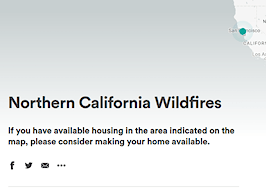Home-renting service Airbnb has raised ire and eyebrows in recent years for totally transforming the way people can book travel accommodations. It also appears to be raising rents and home prices in major U.S. cities, at least according to a new working paper from academics at UCLA, the University of Southern California’s Marshall School of Business, and the National Bureau of Economic Research.
However, the authors caution that the paper is still awaiting peer review and has not been published formally in a journal yet. You can read the pre-review copy here.
The existence of this working paper and its most striking results were reported by The Wall Street Journal last night (Oct. 22). After examining market data from the 100 largest metro areas in the U.S., the authors found “a 10 percent increase in Airbnb listings leads to a 0.42 percent increase in rents and a 0.76 percent increase in house prices.”
The Journal reported on an earlier version of the paper with slightly different results (0.39 percent increase in rents and 0.64 percent increase in home prices), but one of the paper’s co-authors, UCLA assistant professor of economics Edward Kung, told Inman that “improvements to the statistical methodology can lead to slightly different results even though the overall message is the same.”
Kung further cautioned the results could change again from the peer review process, which could take another six months to a year.
While either increase cited may be good for existing homeowners, Kung told the Journal that the results appeared to show Airbnb was contributing the “affordability crisis” going on across the U.S., where mortgage payments and rising rents are eating up more incomes and moving out of reach for increasing numbers in the lower and middle-income brackets.
Kung said that the effect of Airbnb’s short-term rentals was to remove them from the supply of long-term rentals, leading to an increase in the price of long-term rental units and of homes, correspondingly.
The paper drew its data by scraping Airbnb listings from the website and compared them to the Zillow Home Value Index (ZHVI), which is the median Zestimate for a geographic area, and the Zillow Rent Index (ZRI), which is based on Rent Zestimates. And as real estate industry pros have argued, those Zestimates may not always be reflective of reality.
Still, if the paper’s results are correct or in the ballpark, it would seem to provide more ammo for governments looking to regulate, restrict or prohibit Airbnb rentals on the basis of affordability. On the other hand, it could also serve as evidence that Airbnb helps neighborhoods earn more for the real estate.
Reached for comment on the paper, Airbnb spokesperson Nick Papas wrote to Inman in an email:
Airbnb makes housing more affordable — countless families depend on Airbnb to pay their rent and stay in their homes — and and in an opinion survey, 95% of economists and housing experts said they don’t believe home sharing has a significant impact on rents. The authors of this study agree that home sharing can provide important economic benefits for families and support smart rules that allow home sharing to continue.





